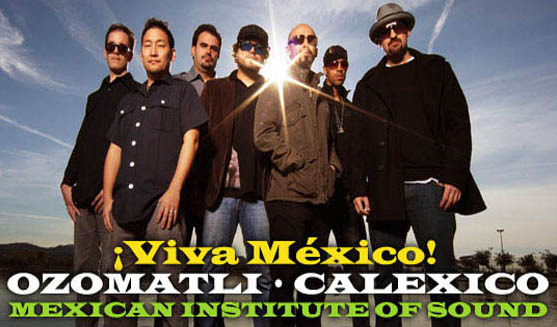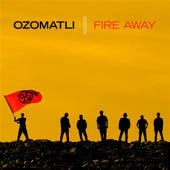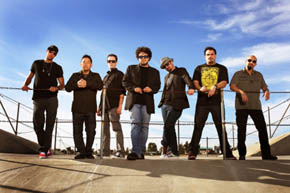
ARCHIVES

OZOMATLI CELEBRATES
ITS ‘QUINCEAÑERA’
In Latino culture, a girl’s ‘quinceañera’ (her fifteenth birthday) is a very big event. It’s her coming out party ala the American ‘Sweet 16’ custom or a Jewish boy’s Bar Mitzvah. In band terms, it’s quite a milestone that several musicians can get along and thrive for such a long period of time, but such is the case with L.A. favorite sons Ozomatli.

In the pantheon of looming Los Angeles rock bands, some artists stand tallest, symbiotically representing the city. In the ‘60s, amidst the drug and sexual revolution it was The Doors; in the ‘70s where excess was king The Eagles were the “life in the fast lane” band. Towards the end of the ‘80s and into the ‘90s bands like Gun N’ Roses and Jane’s Addiction best represented the dark underbelly of Hollywood, with their dangerous heroin chic where unprotected sex and overdoses were rampant.
Over the last 15 years, Ozomatli, a multi-cultured and multi-racial band mixing Latin rhythms with hip-hop beats has proven to be the quintessential Los Angeles band, aptly representing its citizens. The band’s mantra has always been: it will take you around the world by taking you around the city of Los Angeles.
Celebrating the release of its fifth record, Fire Away, the now 7-piece band (singer/guitarist Raúl Pacheco, singer/trumpeter Asdrubal Sierra, bassist Wil-Dog Abers, percussionist Jiro Yamaguchi, rapper Justin 'El Niño' Porée, saxophonist Ulises Bella and drummer Mario Calire) teamed up with notable record producer Tony Berg (Aimee Mann, Pete Yorn) who describes working with Ozomatli “like visiting seven continents simultaneously.”
Named after the Aztec god of dance, the band is known for its outspoken activist viewpoints. In fact, the group first formed through its affiliation with the Peace and Justice Center of Los Angeles, and its first performance was for picketers during a strike. During a protest performance outside of Staples Center (where the new L.A. LIVE megaplex now stands) during the 2000 Democratic National Convention, the band’s set was cut short by authorities, after a blistering set by Rage Against the Machine, and a downtown riot ensued.
Yet in 2009, after an invitation from the Bush Administration, not the band’s favorite regime, Ozomatli served as U.S. cultural ambassadors with a U.S. sponsored State Department trip that included community outreach and performances in Myanmar, Vietnam, Thailand, Madagascar, Jordan, Tunisia, South Africa and Egypt. This year the band will once again serve as cultural ambassadors with a State Department trip to China and Mongolia.

LAdineNclub.com recently sat down with singer/guitarist Raúl Pacheco and bassist Wil-Dog and talked about all things Ozo as well as the band’s homecoming show at the Bowl this weekend.
LAdineNclub.com: Congratulations on the release of Fire Away. Does the title just reflect how you felt at the time?
Raul Pacheco: There were all these suggestions and Amy, our manager, said, “Fire Away,” and then that term came up later because we started going to different places with the songs and the subject matter, and we were presenting the music in a way that we never have before that we felt give us your opinion. You’re going to like it or you’re not, just fire away. This is what we’re giving the world at the moment and I guess we’ll get the responses soon enough.
Sonically, there is definitely a difference with this record. How did that come about?
Wil-Dog Abers: It’s funny because there are always these ideas of how you want your album to sound before you go into the studio, but the reality is once you put a mic on something, you don’t know how it’s going to sound until you go in front of the speakers. I think each one of us might have had his own idea of what we wanted our record to sound like, but with this record, we were re-sampling ourselves almost. In the past we’ve used samples more or we tried to recreate samples so we didn’t have to give publishing rights away, but on this one we went in and jammed for two weeks and some of those jams turned into full fledge songs and then we would sample that and play on top of that.
Raul: Sonically, it is different but we felt when we were playing them live it’s fun and has energy and is exciting and is totally cool. And I just think it was time to set into something different.
All these years and records later, what still inspires you?
Raul: As individuals, we still love playing music, regardless of what it takes to finish a song or a record or perform live, we like to play. I think that is always something that we can have.
How did your collaboration with Jack Johnson “It’s Only Paper” come about?
Raul: We’ve known him for years and we got invited to play one of his festivals that raise money for environment education for kids in Hawaii. So ever since then we’ve known each other and wanted to work together.
You don’t believe in the notion that money is the root of all evil?
Raul: What that song is saying to me is not that money is bad. It’s focusing on this particular person who was a jerk before money came into the picture. The money didn’t make him bad. He was an ass before. It’s a general statement. Don’t be a jerk, be a nice person whether you have money or not. It’s not saying that money is a bad thing. People need money and I just think that what’s even more important than whether you have money or not is if you’re a good person.
It made me think you’ve come a long way if you can say ‘money is only paper.’ Before I’m sure it was about clawing to survive and maybe not even getting paid for gigs.
Wil-Dog: Well, it still happens. We’re still struggling to survive, living month to month. We’re working musicians. Money on a table without humans around it is just that (laughs).
Do you ever feel that people think of you as the cause or benefit band and expect you to play for free?
Wil-Dog: I think the cause of the struggle or human rights is always searching for a voice with art and that’s alright, and we do get asked a lot and we don’t get to play that often because we’re really busy and working. But those things are really important to us. We’re doing the Hollywood Bowl this summer so we have to stay out of people’s way so they’ll want to pay and come see us.
You headlined the Hollywood Bowl recently, what were your original hopes and expectations when you started the band?
Wil-Dog: I think we all had a different vision. I always wanted to be the biggest band in the world. It’s changed but I really thought our first and second record were going to be really, really huge. I just always did in my head. Well, it didn’t happen but a lot of other great things did.
Raul: I was just itching to play music. Once we started playing I was always down for whatever. And once things started happening, it was like, wow, we can make a living doing this. I felt really good about that, that I can sing songs and play guitar and play good music with a really good, exciting band that I’m proud of as a job (laughs).
You even became U.S. cultural ambassadors, for the Bush regime of all things.
Raul: It was fun. When they asked us it was a struggle for us. Some of us said ‘yeah’ and some of us said, ‘fuck that!’ We had arguments about it. And what was cool is that we took the chance and we met the people who were doing the work and it wasn’t a black and white thing. Within any organization there are people that are cool and people that you don’t like. We felt it was the people that were cool that were asking us to do this work. And once we did it, it was working with a lot of young people, music schools, disabled kids. Once you’re there all that shit goes away. You’re just reminding yourself that we’re all human and it’s just a moment that’s really beautiful.
Wil-Dog: From the beginning we’ve always been down to play wherever and we really connect with people really well. We can go anywhere and we’ll give it a shot.
You’re the quintessential Los Angeles band. Talk about L.A. as your muse.
Raul: What’s cool is that we all grew up here and experienced it. It’s not just one section of L.A. We’re a good cross section of experience. When people say that about us I say we are pretty representative of Los Angeles. For seven dudes that play music, we’re a pretty good cross section of what’s going on.
You have the song “Elysian Persuasion” on the new record that talk about your first time.
Raul: I don’t even remember how that title came up but it had a ring to it when those words came together. Then it was about what it means. I remember hanging out there, going cruising, hanging out, under age drinking in the park. Sometimes you’d get into some shit; gun fights. And this song is talking about a young person trying to hookup but really not knowing what the hell it means. Going to a park for the first time with a girl and being scared but going for it and just that excitement you have as a young person. I’m sure there are a lot of stories about Elysian Park (laughs).
Wil-Dog: There are so many lookout points and side streets and you can go up and look out over Dodger Stadium. I was always looking for a spot, whether it was Mulholland or there.
Raul: I think what we’re referring to is the innocence of it too. It’s not an aggressive song. The cat doesn’t know what to do at first and finally he figures it out.
What’s your perfect L.A. day?
Raul: Surfing in Venice. It’s nice and dirty (laughs) and fun.
Wil-Dog: Breakfast in Silver Lake and by the time sundown hits being at La Piedra in Malibu. That’s where you want to be at sunset.
How many days like that do you get?
Wil-Dog: A lot more than most people.
What can you say about the song “Gay Vatos in Love”?
Wil-Dog: It started where Asdru was scoring an independent film about a gay couple so he started playing this old style piano and drum sound. And he was just yelling ‘gay vatos in love’ into the mic and we heard it and said that’s fuckin’ dope. Then we started singing a chorus to it. We didn’t want to turn it into a joke because of all the stuff that was going on. We wanted to be part of the struggle. Raul says this a lot, which I think is really cool, that Ozomatli has always been about the underdog. We always put ourselves out there and speak the unspeakable or represent the voiceless and that song, it’s just amazing, talking about violence against the gay community and Andy Zapata, a transgender female in Colorado who was beaten to death by her boyfriend when he found out. But we also talk about Juan Gabriel who says ‘amor es amor’ which has an irony to it. We just believe that everybody has a right to choose whom they want to be with; whom they want to love.
Was this recorded before the whole Prop 8 mess?
Raul: It happened afterwards. I remember all the protests that happened, we specifically talked about it and wanted to play. But they weren’t calling us. When we started writing that song, it was an important thing for us because it brought up a lot of our own issues about how we feel about this, and how we can present it in a way where it’s not a joke and at the same time it’s not hitting you over the head. It was challenging. And it’s interesting when we play it live. Sometimes it’s very polarizing but I think for us it’s important to put ourselves in a position to take a chance. It’s just in a long line of struggles that we support.
Talk about “Love Comes Down,” that’s just an amazing song, and the first Ozomatli ballad I can think of.
Wil-Dog: Asdru brought in the chorus. He had this little sample that he created. He says the song is about his son coming home and being devastated that a girl he liked turned him down. I remember when he first came with it, he was on the rocks with his life actually, and it’s a cool story and he said it was OK that I say this, he was going through some changes with his wife and they ended up working it out, but it’s interesting how the same experience as a 35-year-old with his wife, his 10-year-old son is having at school. Basically, love comes down. We’ve all been hurt.
Wil-Dog, you sing on the track “Caballito” as your banda alter personality.
Wil-Dog: I’m really into banda music. It started when Ozomatli wanted a banda to end the show at the Hollywood Bowl two years ago and I got into contact through friends of mine with these really famous producers named Los Twins, and they knew everybody and they hooked me up. And we had them play at the Bowl and during rehearsals I was singing banda songs and they tripped out that I knew them. And Ozomatli had an after party and they played but they didn’t bring their singer so I got up there and played for about 45 minutes and half the songs I didn’t even know all the lyrics so I was just faking it. Then someone else asked me to play so I said alright, fuck it. And then I started dressing for the part.
Talk about the song.
Wil-Dog: It’s actually about a musician that’s pretty famous but I’m not going to say who because I heard he would get angry. The guy has a horse-face. I think Tony Berg got really excited about it first. It’s banda music so you either like it or hate it. It’s in your face and there’s something about that that attracts me to it.
Where do you go for good banda music in L.A.?
Wil-Dog: Rancho El Farallon in El Monte. It’s outdoors and has a lot of energy.
KCRW has put together a remix version of Fire Away. Are you feeling their interpretation of your songs.
Raul: We have a great relationship with them. I think we’re one of the bands that has played the most on Morning Becomes Eclectic. They were really into it and we thought it would be interesting. Hopefully people like it. It’s always cool to hear people remix your stuff because it’s never what you expect.
Wil-Dog: The one Anne Litt did, for “Love Comes Down,” she completely redid it. It’s cool.
You’re down to a 7-piece band now, is this the retooled Ozomatli?
Raul: This is the smallest it has ever been. Over the years we had people come in and come out and we got tired of that. We just figured if we could pull it off like this it’s all good.
What do you hope someone would take away from listing to Fire Away?
Raul: I think this band is still relevant and still has it.
Wil-Dog: That they like it! Or that they have an opinion about it one way or the other.
Raul: And if you haven’t seen us yet, you gotta come and join us.


